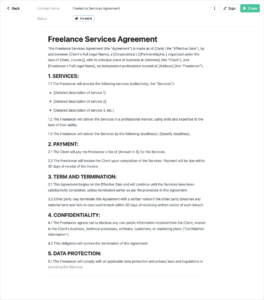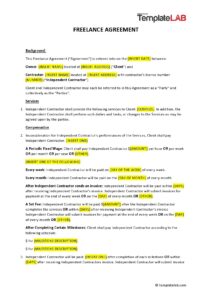Hey fellow future forward freelancers! Landed your first freelance Gig? That’s awesome! However, there’s one important step you must complete before you start the project: the contract. A contract might sound intimidating, but fear not! It’s not that complicated. It’s important, for the benefit of both you and the client, for your relationship to be within the appropriate boundaries.
Understanding Freelance Contracts
A freelance contract is a legally binding agreement between you and your client that outlines the terms and conditions of your working relationship. It serves as a roadmap for the project, clarifying expectations, responsibilities, and payment terms to avoid misunderstandings or disputes down the line.
Why Contracts Matter (They’re Not Just Lawyer Stuff!)
Contracts protect both you and your client. They:
- Set clear expectations: Define the project scope, deliverables, deadlines, and payment terms.
- Prevent misunderstandings: No more “he-said-she-said” situations. Everything’s black and white.
- Ensure timely payments: Get paid what you deserve, on time, every time.
.
- Offer recourse in case of disputes: If things go south, the contract provides a clear framework for resolving issues.
Must-Have Elements in your Freelance Contract
- Your Info and Client Info: Names, contact details, and business names (if applicable).
- Project Scope: Clearly outline the services you’ll provide and what’s not included.
- Deliverables: Specify what the client will receive (e.g., final designs, website copy).
- Deadlines: Set realistic deadlines for project milestones and completion.
- Payment Terms: Define your payment schedule, including deposit amount, payment methods, and late fees (optional).
- Revision Policy: How many revisions are included? Who decides when revisions are necessary?
- Confidentiality: If you’ll be handling sensitive information, include a confidentiality clause.
- Termination Clause: Outline the conditions under which either party can terminate the contract.
Bonus Tip: If the client cancels in the middle of the project, think about adding a “kill fee” clause. This pays you for the labor you have already completed.
However, for a freelance platform like Upwork, it offers and creates a contract for both parties. The only issue is that it might not include some specifics concerning the deliverables of your job. So, I advise my students oftentimes to create what I call ‘’Mindmap’’ on CANVA. This would serve as your own artistic representation of your work deliverables sent to your client without so much officiality. I have used this many times with clients I get, especially on Upwork, and it has always served its purpose at important times.
Samples of a Freelance Contract/Mindmap
 freelance-contract-template-05
freelance-contract-template-05

Conclusion
In conclusion, freelance contracts are invaluable tools for safeguarding your business and ensuring a smooth working relationship with your clients. By understanding the essential elements and using contracts effectively, you can minimize risks and focus on doing what you do best—delivering exceptional work. Now, go out there, seal the deal with that contract, and get ready to rock your next freelance gig!
Dr Temitope Olukunle-Okeseeyin,
Founder, University of Freelancing.
https://universityoffreelancing.org/freelance-pricing-hourly-vs-project-based-rates/
https://www.contractscounsel.com/t/us/freelance-contract
https://enterprise.fiverr.com/blog/how-to-write-a-freelance-contract/




